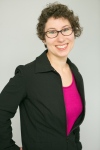Interview conducted by Sandra Otto.
Our popular monthly program meetings often feature a jam-packed agenda. We like to keep our introductions short, so you can hear more from our panellists and less from us! It’s hard to do justice to the incredible wealth of experience these guests bring to the table, so we are offering you a preview with this short Q&A beforehand.
This month, we are honoured to be joined by Michelle Waitzman, who will be talking about ways to evaluate new opportunities, so you can move your career in the direction you want.
Making Smart Choices: Which freelance projects are right for you? is based on her standing-room-only session at the 2019 Editors Canada conference in Halifax (co-presented with Jess Shulman).
Was there a time you stepped outside your comfort zone and loved it?
To be honest, I don’t find my “comfort zone” all that comfortable because I’m easily bored. As a result, I’m always pushing outside of it. The biggest leap I’ve taken out of my comfort zone was the most rewarding. In 2005, I moved from Toronto to Wellington, New Zealand, where I had no job lined up and no friends or family. I loved it there and stayed for seven years (and met my now-husband)! But professionally speaking, I think as a freelancer you sometimes need a “fake it till you make it” attitude. I often apply for “moonshot” gigs because you never know when someone will say yes. For example, I responded to a job posting for writing biographical material in the computer science field. I have no computer science background, and the only bios I’d written before were short website blurbs. I got the gig, and so far I’ve had the opportunity to write 15,000-word biographies of five fascinating people who’ve all won the highest honour in computer science, the A.M. Turing Award.
Left brain is logic, right brain handles the creative load. Do you approach editing and writing assignments differently?
Perhaps because I work only in non-fiction, I approach both writing and editing from a problem-solving perspective. What does the reader need to know? What’s the best way to convey the information? How can I make it clear and interesting? The major difference is the stage at which I get to begin. My writing starts with a lot of research and perhaps interviews. When I’m editing, I can skip ahead to organizing and clarifying.
What is the best or most unusual compliment you’ve received from a client?
I’ll classify this as a compliment: I was copy editing a textbook on property law, which is complex and sometimes archaic (there was a reference in the text to the Domesday Book, published in 1086). The author/professor told me that I deserved an honorary JD (juris doctor) degree for being able to comprehend the material well enough to edit it. But I’m still waiting for that degree to come through.
More about Michelle Waitzman
 Michelle Waitzman is a non-fiction writer and editor who worked in TV production and corporate communications before going freelance. She enjoys the variety of work that freelancing brings and loves learning new things from the projects she’s working on. She works on content ranging from law textbooks to Facebook posts, and has written about outdoor sex, pigeon-guided missiles, cryptography, and immigrating to New Zealand.
Michelle Waitzman is a non-fiction writer and editor who worked in TV production and corporate communications before going freelance. She enjoys the variety of work that freelancing brings and loves learning new things from the projects she’s working on. She works on content ranging from law textbooks to Facebook posts, and has written about outdoor sex, pigeon-guided missiles, cryptography, and immigrating to New Zealand.
Sandra Otto specializes in developmental editing and manuscript evaluations. She is the seminars chair for Editors Toronto.
This article was copy edited by Mario Salazar-Davalos.
